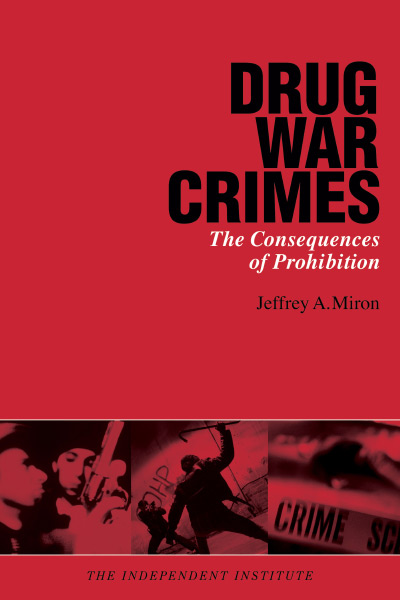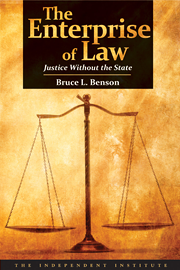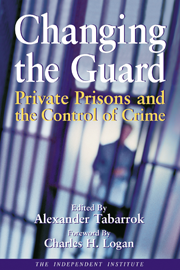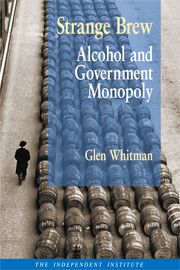| List Price: | ||
| Price: | $14.50 | |
| Discount: | $2.45 (Save 14%) |
| Formats |
Paperback |
eBook |
| List Price: | ||
| Price: | $14.50 | |
| Discount: | $2.45 (Save 14%) |
| Formats |
Paperback |
eBook |
Overview
The “War on Drugs” claims thousands of lives every year in the United States. Each year, the U.S. government spends over $30 billion on the drug war and arrests 1.5 million American citizens on drug-related charges. There are now nearly half a million Americans imprisoned for drug offenses. The official claim is that drug prohibition deters drug use, reduces crime, and improves public health. But is this claim valid?
In Drug War Crimes, Jeffrey Miron offers a balanced and sophisticated analysis of the true costs, benefits, and consequences of drug prohibition. The evidence yields a disturbing finding: the more resources given to the Drug War, the greater the homicide rate. Miron then examines various alternatives to drug prohibition and identifies the most effective solution.
Contents
- Chapter 1: Introduction
- Chapter 2: The Economic Analysis of Drug Prohibition
- Chapter 3: The Effect of Drug Prohibition on Drug Consumption: Evidence from Alcohol Prohibition
- Chapter 4: Prohibitions and Violence
- Chapter 5: Is Prohibition Good Policy?
- Chapter 6: Alternatives to Prohibition and Other Policies Toward Drugs
- Chapter 7: Conclusion
- References
- Index
- About the Author
Detailed Summary
- The U.S. government spends more than $33 billion and arrests 1.5 million people annually to enforce drug prohibition—a federal policy that has been in effect for almost eighty years. More than 318,000 people are currently behind bars for breaking U.S. drug laws—more than the total number of people incarcerated for all crimes in the United Kingdom, France, Germany, Italy, and Spain combined.
- Drug law enforcement in the United States is severe enough to impact the lives of millions, but it is ineffective at reducing drug consumption. Although there are more than 1.2 million possession arrests each year, there are more than 28 million drug users, and most users purchase drugs on multiple occasions. Many arrests for possession occur because the arrestee violated some other law—prostitution, theft, speeding, loitering, disorderly conduct, and so on—and was found to possess drugs. (p. 11)
- Although prohibition raises some costs of supplying drugs, it lowers other costs. Drug suppliers, for example, do not pay income taxes or Social Security taxes, nor need they obey minimum wage laws or other labor regulations. As a result, prohibition does not appear to raise the price of drugs or reduce consumption as much as is commonly thought.
- Don’t the large “price markups” of illegal drugs mean that drug prohibition raises prices (and thus discourages use)? Not necessarily. Coffee, chocolate, tea, and beer have markups similar to (or larger than) cocaine and heroin. The large “markup” between raw materials and the street-ready heroin and cocaine, therefore, is unlikely to be attributable to prohibition. (p. 36-37)
- Isn’t the rise of drug prices at least partly due to prohibition? The premise of this question is false. Adjusting for inflation and drug purity, drug prices have generally declined over the past two decades. Cocaine’s price fell in real terms from $450 per pure gram in 1981 to about $100 by 1996.
- Alcohol prohibition also did not greatly reduce alcohol consumption. Deaths from liver cirrhosis (a proxy for alcohol consumption) fell by a modest 10 to 20 percent. Alcohol consumption probably fell by a similarly modest amount. (p. 26)
- There is a strong correlation between the violent crime rate and drug law enforcement: when drug prohibition increases so does the homicide rate. Similarly, countries with greater enforcement of their drug laws have more violent crime. Eliminating drug prohibition would likely cut the homicide rate in the United States by 25–75 percent. (p. 51)
- Although virtually all countries have drug prohibition laws similar to those of the United States; the degree of enforcement differs substantially. Using drug seizures by the police and customs agents as a measure of prohibition enforcement, the evidence consistently supports the hypothesis that prohibition enforcement increases the violent crime rate. (p. 54)
- Drug use produces far smaller spillover costs to society than is often suggested. But even if the costs were large, public policy should weigh those costs against prohibition’s considerable costs: 1) the loss of utility to drug users whose consumption imposes no social costs, 2) the direct cost of enforcing prohibition, and 3) the indirect costs of prohibition, such as increased violent crime.
- Drug legalization would greatly reduce crime and increase drug use probably only modestly, mainly by casual consumers. (Marijuana decriminalization has not result in increased marijuana use.) Merely decriminalizing drugs would not eliminate a black market and violent crime. Reduced violence in jurisdictions that have decriminalized marijuana, for example, is due to reduced enforcement, not simply reduced penalties for users possessing small quantities. (p. 78)
Many people believe that the huge cost of drug prohibition is an acceptable price to pay for its purported benefits—reduced drug use and associated health problems, fewer traffic and industrial accidents, and less crime and poverty.
According to economist Jeffrey A. Miron, however, most of the ills typically attributed to drug consumption are due not to drugs per se but to drug prohibition. In Drug War Crimes: The Consequences of Prohibition, Miron shows that prohibition increases violence, creates new health risks for drug users, enriches criminals, and diminishing our civil liberties. Prohibition, he forcefully argues, is a poor method of reducing drug use and an inappropriate goal for government policy.
The Economics of Drug Prohibition
Drug War Crimes begins by showing that the standard economic analysis of drug prohibition is flawed. Prohibition does not necessarily induce a large reduction in drug consumption; it may even contribute to drug use. Moreover, prohibition may increase crime rather than decrease crime, and diminish health and productivity rather than enhance them. Even if prohibition substantially reduces drug use, it creates numerous undesirable consequences such as corruption, infringements on civil liberties, wealth transfers to criminals, unwarranted restrictions on medicinal uses of drugs, and rebellion in drug-producing countries.
Miron ’s economic analysis of prohibition then shows that two issues are central to an ethical examination of prohibition. The first is whether prohibition has a large or small effect on drug consumption. If the prohibition does not reduce drug consumption by much, then any benefits that might result from reduced consumption are also small. This would imply that the costs of prohibition almost certainly exceed the benefits.
The second issue is whether prohibition increases or decreases crime. If prohibition increases rather than decreases crime, then prohibition may be counterproductive even if it reduces drugs substantially. Prohibition’s effect on consumption and crime thus deserve special attention.
Does Prohibition Reduce Consumption?
Although not identical to current drug prohibition in structure or enforcement, America’s experience with alcohol prohibition provides a natural “laboratory” for studying the effects of drug prohibition on drug consumption. Debates over prohibition routinely cite this episode as supporting one side or the other, but previous studies have not controlled adequately for factors other than prohibition that might have influenced cirrhosis (a proxy for alcohol consumption). Miron’s analysis indicates that alcohol prohibition had a modest effect on alcohol consumption, which implies that drug prohibition has a modest effect on drug use. Miron cites evidence from a variety of sources suggesting the same conclusion.
Does Prohibition Reduce Violence?
Advocates of prohibition claim that drug use causes violent behavior, while its critics claim that prohibition generates violence by forcing drug markets underground. These claims are not mutually exclusive, but it is important to determine which effect tends to predominate. Miron begins his analysis of these competing claims by examining U.S. homicide rates over the past century. The evidence that alcohol prohibition modestly reduced alcohol consumption suggests that drug prohibition has a modest impact in reducing violence, but this evidence is not by itself decisive; other issues have much bearing.
Both drug and alcohol prohibition, Miron shows, coincided with increases in the homicide rate, consistent with the view that under prohibition people settle their disputes by substituting guns for lawyers. Miron also examines the relation between prohibition and violence across countries. Again, the evidence indicates that vigorous enforcement of prohibition is associated with higher, rather than lower, rates of violence, contrary to the standard defenses of prohibition. And a broad range of other evidence is consistent with this conclusion.
Should Policy Attempt to Reduce Drug Consumption?
Next, Drug War Crimes turns to the question of whether prohibition is desirable. Setting aside any reduction in drug consumption achieved by prohibition, virtually all of prohibition’s effects are undesirable. The question for policy analysis is therefore whether these negative consequences are worth paying in exchange for whatever reduction in drug consumption prohibition achieves.
Miron addresses this issue by first asking whether reduced drug consumption is an appropriate goal for government policy. (This assumption that it is, does not follow from standard economic principles.) Reduced drug consumption might be an appropriate goal if drug consumption generates large negative externalities or if consumer choices about drug consumption are myopic, but the evidence shows that externalities from drugs, and myopia with respect to drugs, are both modest relative to exaggerated fear stories promulgated by prohibitionists. [Again, he needs to present evidence, not simply assert that evidence exists.] Moreover, neither externalities nor myopia related to drugs are obviously different from those of many legal goods. In any case, policies to reduce drug consumption make sense only if their benefits exceed their costs. Since prohibition has substantial enforcement costs and itself generates externalities, prohibition is a poor choice for reducing drug consumption.
Alternatives to Prohibition
If prohibition is not the right policy, then what is? Drug War Crimes argues that modifications of current prohibition, such as diminished enforcement, decriminalization, medicalization, or legalization of marijuana only, are moves in a beneficial direction, but they are inferior to a regime in which drugs are legal. Within a legal regime, policies such as subsidized treatment, needle exchanges, public health campaigns, age restrictions, or limits on advertising might have desirable effects, but these policies also have negative consequences that can outweigh any positives.
Conclusion
“It is, of course, true that some people ruin their lives with drugs,” writes Miron. “The right question for policy analysis, however, is not whether drugs are sometimes misused but whether policy reduces that misuse, and at what cost. The best available evidence shows that prohibition reduces drug use only modestly, and most of this reduction is for casual users rather than ‘addicts.’ It is hard to see, therefore, how any benefits from prohibition could possibly outweigh its incredible costs.
“Under legalization, there would still be problems related to drugs. Specifically, a small fraction of users would harm themselves and occasionally others, as occurs now for a range of legal goods. Most users, however, would obtain benefits that exceeded any costs, and the enormous externalities imposed by prohibition would disappear.
“Critics will claim these conclusions rest on research that is subject to a broad range of caveats: data problems, reverse causation, and the like. This claim is accurate—none of the arguments here ‘prove’ that legalization is better than prohibition. Nevertheless, the arguments and data mustered for legalization are of far greater quality and objectivity than any brought to bear for prohibition. A critical question, therefore, is which side bears the burden of proof?
“As a practical matter, inertia and other political forces mean legalizers now bear that burden. Yet there is no reason to give prohibition the benefit of the doubt. American tradition should make legalization—i.e., liberty—the preferred policy, barring compelling evidence prohibition generates benefits in excess of its costs. As I have demonstrated here, a serious weighing of the evidence shows instead that prohibition has enormous costs with, at best, modest and speculative benefits. Liberty and utility thus both recommend that prohibition end now: the goals of prohibition are questionable, the methods unsound, and the results are deadly.”
Praise
“In Drug War Crimes, Miron offers a powerful economic analysis detailing the irrationality of using the criminal law to prohibit drugs. He offers an equally powerful explanation of the terrible human harm caused by the drug war and advances the only practical alternative to the present failed policies.”
—Joseph D. McNamara, former Chief of Police of San Jose, Calif. and Kansas City, Missouri; Research Fellow, Hoover Institution
“Miron’s arguments are lucid, well-reasoned, and powerful. Legislators and other policy-makers would benefit from his non-politicized, non-moralistic approach; everyone can benefit from reading this important, insightful work.”
—Margaret M. Russell, former Vice President, ACLU; Professor of Law, Santa Clara University
“The case for drug legalization has been made before, but Jeffrey Miron strengthens and enriches the case with his analyses of data from the prohibition era and from other countries that strongly corroborate the common sense conclusion that drug prohibition causes far more crime, disease and death than would legalization, or even a retrenchment of the irrational drug war we have been mired in for nearly a century.”
—Steven B. Duke, Professor of Law, Yale University
“For economists, drug prohibition is fundamentally implausible. Surely there are more efficient and less intrusive ways of controlling the externalities of drug use. The basic facts of prohibition as practiced in early twenty-first century America only reinforce the impression that this is suboptimal policy. The vast costs associated with drug abuse currently are most visibly the consequence of prohibition rather than drug use. Drug-related crime is driven not primarily by the drugs but by the high prices and the lack of enforceable property rights in illegal markets; the HIV associated with injecting drug use is also a consequence primarily of prohibition rather than heroin use itself. The possible gains from prohibition in terms of harms prevented, if there are any, are neither visible nor conceptually well grounded. . . The exposition of this slim monograph is non-technical and the goal is clearly to reach a broad audience. . . . In the end, Drug War Crimes will reassure . . . that regulated legal markets must be better than prohibition.”
—Journal of Economic Literature
“Professor Miron has made a highly significant improvement to the canon of drug war literature and his book can well be used as the standard for judging all else in the field. He approaches the subject with scholarly precision and treats all arguments, pro and con, with integrity and clear perception. Drug War Crimes avoids all the hyperbole of zealots willing to dispense with truth, objectivity and reason for the sake of their predetermined positions. A reasonable mind will find this book exceedingly valuable. It is a totally honest book that has been needed for a very long time.”
—John L. Kane, Jr., Senior Judge, U.S. District Court
“In Drug War Crimes, Jeffrey Miron has written a thoughtful analysis that questions the basis for the official war on drugs. He uses current evidence and historical precedent to support legalization by showing that prohibition only makes a slight dent in drug use. Instead, as Miron persuasively demonstrates, the net effects of prohibition, both past and present, are to increase violence, enrich criminals, threaten civil liberties, and make drug users more ill. The right question for policy makers, he concludes, is not whether drugs are misused but whether the benefits of prohibition outweigh its exorbitant costs. All in all, this is a solidly researched and dispassionate discussion of a topic that is too often couched in moral and emotional terms.”
—Hubert Williams, President, Police Foundation; former Chief of Police, Newark, New Jersey
“With the publication of Drug War Crimes, Jeffrey Miron . . . elaborates his key argument that the social ills widely attributed to illegal drugs result largely from their prohibition, rather than from their use per se. . . . I found his analysis particularly insightful for its elucidation of various interacting dynamics of supply and demand in illegal drug markets, which usually escape consideration. Miron focuses on these dynamics to refute the common assumption that prohibition drives prices to stratospheric levels, and also uses them to demonstrate convincingly that the effects of prohibition on rates of drug consumption are negligible. . . . Drug War Crimes demands the attention of anyone concerned with drug policy. Given Miron’s ideological perspective, the book presents a head-on challenge to many conservative prohibitionists, who cannot ignore how their position on drugs conflicts with an otherwise uniform devotion to market deregulation and the logic of caveat emptor. In this regard, Miron unintentionally demonstrates that, in the end, the actions of drug users and governments alike defy the logic of utility and cost-benefit analysis. It is the sociopolitical, cultural, and moral complexity of this defiance that ultimately makes the crisis of drug use so profoundly formidable.”
—Canadian Journal of Criminology and Criminal Justice
“It is drug prohibition that causes most ills typically attributed to drugs. Prohibition’s ability to reduce drug use is modest, while incurring many negative consequences: increased violence and corruption, diminished respect for the law, reduced health for drug users (by denying medicine to seriously ill patients), money transfers to criminals and terrorists, distorted criminal justice incentives, and diminished civil liberties. . . . American tradition should make legalization—i.e., liberty— the preferred policy. Drug War Crimes is clear and logical—but will a majority of U.S. voters approach this issue with logical detachment?.”
—Future Survey
“Arguing that the war on drugs is a poor method of reducing drug use, Miron pulls together the evidence to show how prohibition has increased the level of street violence, expanded health risks for drug users, drained criminal justice resources away from more serious crimes, diminished civil liberties, restricted the medicinal uses of drugs, generated insurrection in drug-producing countries, and speeded the transfer of massive amounts of wealth to criminals. The costs, in short, have exceeded the benefits. Miron's answer: ‘Liberty and utility both recommend that prohibition end.’”
—The American Spectator
“For decades the U.S. government has attempted to suppress the use and sale of illicit substances. . . . Drug War Crimes persuasively argues that this campaign has been not just ineffective, but counterproductive. . . . While Miron might not convince the most dedicated drug warrior, he has presented a powerful case that the drug war is counterproductive. His evidence deserves a serious response. Americans no longer blithely assume that drug prohibition is making them safer and better off. Mr. Miron have presented a powerful case against the drug war. Drug prohibition is making Americans neither safer nor better off.”
—Washington Times
Author
Jeffrey A. Miron is professor of economics at Boston University. His articles on drug policy have appeared in Social Research, Journal of Law and Economics, The Boston Globe, and the London Observer. He received his Ph.D. in economics from the Massachusetts Institute of Technology.















